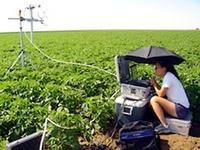-
Reducing use of nitrogen-based fertilizers helps combat climate change

Nitrogen-based fertilizers spur greenhouse gas emissions by stimulating microbes in the soil to produce more nitrous oxide. Nitrous oxide is the third most important greenhouse gas, behind only carbon dioxide and methane, and also destroys stratospheric ozone. Agriculture accounts for around 80 percent of human-caused nitrous oxide emissions worldwide, which have increased substantially in recent years, primarily due to increased nitrogen fertilizer use. Scientists help farmers around the globe apply more-precise amounts of nitrogen-based fertilizer to help combat climate change.
-
-
Drones offer farmers eyes in the sky to check on crop progress

Commercial use of unmanned aerial vehicles in U.S. airspace was banned by the Federal Aviation Administration in 2007, although growing numbers of hobbyists have been toying with the use of drones, particularly for aerial photography. Facing mounting pressure from agribusiness, retail, and other industries, however, the FAA is expected to release new policies by 2015 that will enable businesses to integrate drones into their operations. The agriculture industry is expected to be one of the largest market segments for drone usage. This growing season, crop researchers at the University of Illinois are experimenting with the use of drones on the university’s South Farms. A crop sciences educator is using two drones to take aerial pictures of crops growing in research plots on the farms.
-
-
Scientists divided on whether to destroy last stocks of smallpox virus
While smallpox has been eradicated since 1980, the World Health Organization (WHO) still maintains a stockpile of the virus — a measure which is becoming an increasingly contentious issue for members of the 194-nation organization. Some scientists argue that the stockpiles of the virus should be maintained until there is a completely confirmed response to any possible future smallpox outbreak, while other scientists argue that the danger of an accidental outbreak or terrorist bioattack using the virus far outweighed any advances to be made by additional live testing.
-
-
Scientists: immediate action required to address superbugs’ threat
Scientists warn that drug-resistant superbugs demand an immediate, serious response and that the steps required to plan for these pathogens were not properly taken in previous decades. “[A] world without effective antibiotics would be ‘deadly,’ with routine surgery, treatments for cancer and diabetes and organ transplants becoming impossible,” says one scientist. The scientists warn that if action is not taken immediately, the massive health gains made since Alexander Fleming’s discovery of penicillin in 1928 will be lost forever.
-
-
Canada donates Biosafety Level 3 modular laboratory to Caribbean health authorities
The Biological Security program of Canada’s Global Partnership Program(GPP) has officially transferred a new biological containment laboratory to the Caribbean Public Health Agency(CARPHA). The Biosafety Level 3 (BSL-3) modular laboratory facility, a first in the Caribbean and located in Port of Spain, Trinidad and Tobago, improves diagnostic capabilities for human and veterinary pathogens with high epidemic potential.
-
-
Leidos awarded DHS Plum Island biolab contract
DHS awarded Reston, Virginia-based Leidos a prime contract to support and supplement the Science and Technology (S&T) Agricultural Scientific Program at the Plum Island Animal Disease Center (PIADC). The single-award time and materials (T&M) contract has a one-year base period of performance, four one-year options, and a total contract value of approximately $12 million if all options are exercised. Work will be performed in Orient Point, New York.
-
-
Extreme weather exposes the toxic legacy of an industrial past
The increase in the number and intensity of extreme weather events in the United States carries with it yet another, more insidious danger: it forces to the surface toxic lead from long-shuttered smelters. Lead smelters had mostly closed down in the United States by the 1980s, but they left behind millions of tons of toxic waste. One example: In 2011, Joplin, Missouri suffered a devastating tornado which killed 158 people and flattened much of the city. Decades of lead processing in the Joplin area had created about 150 million tons of toxic wastes, with about 9 million tons still remaining after a federal Superfund cleanup. The 2011 tornado forced some of the buried lead to the surface, forcing Joplin to spend $3.5 million so far on lead clean up. The city now requires builders to test for lead, and clean up any traces, before beginning construction.
-
-
Scientists urge U.S. to do more to detect, prevent use of bioweapons
Carefully targeted biological weapons could be as dangerous as nuclear weapons, so the United States should invest more resources in developing technologies to detect them, scientists say. What is especially worrisome is that “The advent of modern molecular genetic technologies is making it increasingly feasible to engineer bioweapons,” says one expert. “It’s making people with even moderate skills able to create threats they couldn’t before.” There is another worry: “A high-tech bioweapon could cost only $1 million to build,” the expert adds. “That’s thousands of times cheaper than going nuclear. Iran’s centrifuges alone cost them billions.”
-
-
Experiments with dangerous bird flu stains pose risk of accidental release
Experiments creating dangerous flu strain that are transmissible between mammals pose too great a risk to human life from potential release, according to researchers. Although experiments on these so-called novel potential pandemic pathogens (PPPs) are conducted at high levels of biosecurity, the researchers argue that they pose a substantial risk to human life. They are calling for greater scrutiny of experiments that make virulent influenza strains transmissible, and for future studies on flu transmission to use safer and more effective alternative approaches.
-
-
Dramatic drop in Central Valley wintertime fog threatens California’s agricultural industry

California’s winter tule fog — hated by drivers, but needed by fruit and nut trees — has declined dramatically over the past three decades, raising a red flag for the state’s multibillion dollar agricultural industry, according to researchers at UC Berkeley. Many crops go through a necessary winter dormant period brought on and maintained by colder temperatures. Tule fog, a thick ground fog that descends upon the state’s Central Valley between late fall and early spring, helps contribute to this winter chill. The findings have implications for the entire country since many of these California crops account for 95 percent of U.S. production.
-
-
Mustard plants help detect use of chemical weapons
Making nations comply with the Chemical Weapons Convention requires that scientists can accurately detect the use of chemical warfare agents. Currently they carry out tests on soil from areas where use is suspected. Many nerve agents composed of organo-phosophorous compounds, however, leach from soil over time, removing the evidence of use and making verifying the deployment of chemical weapons like sarin, soman, and VX difficult. Researchers report that white mustard plants can help by allowing detection for up to forty-five days after the chemical weapons were used.
-
-
Soil bacteria may offer insights into curbing antibiotic resistance
Drug-resistant bacteria annually sicken two million Americans and kill at least 23,000. Antibiotic-resistant disease now adds $20 billion to annual health-care costs and leads to eight million additional hospital treatment days in the United States. A driving force behind this growing public health threat is the ability of bacteria to share genes that provide antibiotic resistance. Bacteria that naturally live in the soil have a vast collection of genes to fight off antibiotics, but they are much less likely to share these genes, suggesting that most genes from soil bacteria are not poised to contribute to antibiotic resistance in infectious bacteria.
-
-
Cesium chloride blood irradiators increase dirty bomb risk
Federal officials want to halt the use of blood irradiators used by hospitals and blood centers to ensure that blood is properly treated before transfusions occur. The irradiation devices contain cesium chloride, a highly radioactive powder which terrorists could use to make a dirty bomb. A 2008 reportby the National Academy of Sciences recommended stopping the licensing of new cesium chloride radiation sources, thereby encouraging the adoption of alternative sources with a less dispersible form of radioactive cesium, including cobalt-60 or X-ray irradiators.
-
-
Converting light to sound for better weapons detection, medical imaging
A device that essentially listens for light waves could help open up the last frontier of the electromagnetic spectrum — the terahertz range. So-called T-rays, which are light waves too long for human eyes to see, could help airport security guards find chemical and other weapons. They might let doctors image body tissues with less damage to healthy areas. They could also give astronomers new tools to study planets in other solar systems. Those are just a few possible applications.
-
-
Border Collies chase away beach contamination
Gull droppings may be one source of the indicator bacterium Escherichia coli to beach water, which can lead to swim advisories and beach closings. Border Collies are effective at reducing gull congregation on recreational beaches, resulting in lower E. coli abundance in the sand.
-
More headlines
The long view
We Ran the C.D.C.: Kennedy Is Endangering Every American’s Health
Nine former leaders of the Centers for Disease Control and Prevention (CDC), who served as directors or acting directors under Republican and Democratic administrations, serving under presidents from Jimmy Carter to Donald Trrump, argue that HHS Secretary Roert F. Kennedy Jr. poses a clear and present danger to the health of Americans. He has placed anti-vaxxers and conspiracy theorists at top HHS positions, and he appears to be guided by a hostility to science and a belief in bizarre, unscientific approaches to public health.
